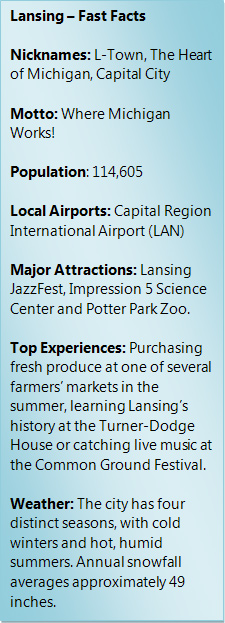 Home to the Big Ten's Michigan State University, Michigan's Supreme Court and Court of Appeals, Michigan's capital city of Lansing has a strong educational and governmental presence among the 50 states.
Home to the Big Ten's Michigan State University, Michigan's Supreme Court and Court of Appeals, Michigan's capital city of Lansing has a strong educational and governmental presence among the 50 states.
Thinking about moving to Lansing? You can get started by filling out a free quote form right here at Movers.com to compare prices on moving services. If you're still deciding, read the following guide for more information about moving to the city.
Lansing Climate
When moving to Lansing, you will find a climate typical of the Midwest, as the city's temperatures are greatly influenced by the Great Lakes. Winters usually last about three or four months, with temperatures ranging from lows in the 20s to highs in the 40s. The area experiences approximately 40 days of snow during the year, and over 130 days of rain.
In the summer, temperatures can exceed 90 degrees, but the average temperature in July (the hottest month) is 82 degrees. Most of the city's rainfall occurs during the summer months, but is still considerable in the winter.
Lansing Neighborhoods
If you're interested in exploring what Downtown Lansing has to offer, you'll find the area holds many tall buildings, mostly governmental, mixed with restaurants, retail stores, residential areas and one of the oldest operating farmers' markets in the U.S.
Just north of downtown is Old Town, which overlooks the Grand River. This area is listed on the National Register of Historic Places, and contains many buildings from the mid-19th century, including the first residential home built in Lansing. In recent years, it has become a hub for the city's arts and culture.
For more residential districts, check out: Cherry Hill, REO Town, Colonial Village and Genesee.
Registering Your Car
Upon your relocation to Lansing, you'll need to head over to the Michigan Department of Motor Vehicles for a new license, registration and tags. To transfer your registration to the state, you will need proof of auto insurance in Michigan, identification and the original vehicle title. To transfer your driver's license, you will need proof of identity and residence, your Social Security card, valid Michigan auto insurance, and you will have to pass a vision test and knowledge test.
The average fee for a license is $25 and the cost of registration and plates can run $20 and up depending on whether or not you choose special tags.
Lansing Schools
Lansing School District provides public education to students in the city, covering over 50 miles. It is home to over 25 schools, including three high schools and various elementary, middle and magnet schools.
As far as higher education goes, Michigan State University holds top billing in the area, located in East Lansing. The school has the largest campus in the U.S. and is home to many research programs and highly recognized academic programs. There's also the Thomas M. Cooley Law School, Lansing Community College, Western Michigan University, Davenport University, Central Michigan University and Great Lakes Christian College.
Lansing Employment
When looking for employment in Lansing, you should look into some of the major industries that support the city's economy, like government, education, insurance and healthcare. The unemployment rate in the Lansing metro area was just above 7 percent as of May 2013, according to the Bureau of Labor Statistics.
According to the city's 2011 Comprehensive Annual Financial Report, some of Lansing's top employers are: State of Michigan, with over 14,000 employees; Michigan State University, with over 11,000 employees; Sparrow Health System, with over 7,000 employees; and General Motors, with nearly 4,000 employees.
Living Costs in the City
As a new Lansing resident, you may be able to become a homeowner much faster than you originally thought, as the cost of living in the area is well below the national average. In fact, the overall cost is approximately 18 percent lower. The current average listing price is just above $90,000 for a single-family home, though there are homes in the area that can reach closer to $400,000.
According to Lansing Economic Area Partnership's website, 70 percent of residents in the Greater Lansing Area can own instead of rent, and 75 percent of residents spend less than 30 percent of their income on housing costs.
Lansing Moving Resources
Moving and storage companies will gladly service your move to Lansing, whether you're moving from out of state or from another county in Michigan. Make sure you get estimates from multiple moving services before you commit to hiring any (at least three estimates). Check back to our guides for tips on how to choose your moving service wisely with important questions to ask, differentiating between types of estimates, and mistakes to avoid. Visit the following pages at Movers.com to get quotes for the following services:
Lansing Transportation
 Whether you own your own car or you rely on public transportation, you will find many ways to get around in Lansing. The Capital Area Transportation Authority (CATA) provides the bus service all over the metropolitan area, and a ridership of almost 12 million rides in 2012. CATA also provides a "Night Owl" service and paratransit through Spec-Tran.
Whether you own your own car or you rely on public transportation, you will find many ways to get around in Lansing. The Capital Area Transportation Authority (CATA) provides the bus service all over the metropolitan area, and a ridership of almost 12 million rides in 2012. CATA also provides a "Night Owl" service and paratransit through Spec-Tran.
For intercity travel, Greyhound Line buses are available downtown. Amtrak provides intercity rail service, and taxis are scattered all through the city. If you're traveling by air, you will most likely use Capital Region International Airport or Detroit Metro Airport.
If you will be commuting via personal vehicle, some of your main highways will be: Interstate 69, Interstate 96, Interstate 496 and U.S. 127.
If you own a bike, you will have access to the 13-mile Lansing River Trail along Grand River and Red Cedar River. The trail passes through notable points of interest in the city like Michigan State University, Potter Park Zoo and Moores Park.
Culture & Contemporary Life
 From annual parades, to festivals, to music and theatre, Lansing is much more than government buildings downtown.
From annual parades, to festivals, to music and theatre, Lansing is much more than government buildings downtown.
For family fun, check out the Potter Park Zoo, which has over 160 species of animals including tigers, pandas, Snow Leopards, Bali Mynah Birds and Tamarin Monkeys. The park is complete with events and education for children and families. The Impression 5 Science Center is also great for kids, as it provides a hands-on interactive learning environment based on the five senses.
If you have a thing for fresh produce, Lansing has plenty farmers' markets to choose from throughout the summer months, including the historic Lansing City Market which is open year-round.
The city is home to Lansing Art Gallery, founded in 1965, and various dance and theatre companies, if you're looking for a taste of the arts. You can also enjoy the Old Town BluesFest, Lansing JazzFest and Common Ground Festival each year for live musical acts.
Lansing Relocation Tips
-
Though the cost of living is relatively low compared to the rest of the country, you still want to do as much research as you can on housing and employment - it's always better to have a game plan before you pack up and move.
-
The city is bicycle friendly, so bring (or buy) a set of wheels and get some exercise while you explore your new home!
-
Be sure to pack plenty of clothing for all kinds of weather, since Lansing experiences it all. Heavy coats and snow boots for the winter, and shorts, flip flops and loose-fitting clothing for the summer will be essential.